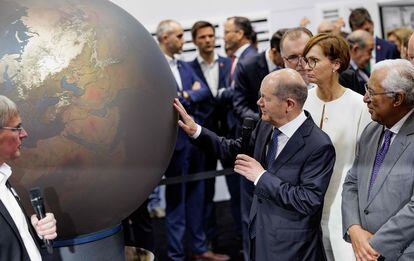German Chancellor Olaf Scholz, accompanied by Portuguese Prime Minister António Costa, during a visit to the Hannover industrial fair on Monday. AXEL HEIMKEN (AFP)
Three months have passed since the now famous speech in which Chancellor Olaf Scholz announced the
Zeitenwende
, the historic turn in German foreign and defense policy.
But he already has a free hand to spend the 100 billion euros he promised to improve the capabilities of the German army in the coming years.
"It's a big step for our country," Scholz acknowledged Monday in Hannover.
It is indeed the largest German rearmament operation since World War II.
Russia's invasion of Ukraine has been a turning point for Germany, which had underfunded the Bundeswehr for decades to the point that high-ranking military leaders publicly criticized its failure to defend the country in the event of attack in February.
"This will help make Germany and Europe safer," Scholz said Monday at the opening of the Hannover industrial fair.
On Sunday night, after three hours meeting and many more preparing the ground, the tripartite of Social Democrats, Greens and Liberals agreed with the Christian Democrats to create this special fund, which requires a reform of the Constitution.
“The army will be strengthened, which will be able to fulfill its defense mandate better than ever and will be able to make its contribution to NATO so that we can defend ourselves against attacks from abroad at any time,” the foreign minister added on Monday.
On February 27, just three days after the start of Vladimir Putin's war against Ukraine, Scholz solemnly appeared before the German Parliament and announced the historic turn that the country was about to undertake.
A day earlier he had already erased decades of restrictive arms export policy by authorizing the shipment of missiles to a war zone.
The conservative opposition has not made it easy for him, but finally an agreement has been reached, necessary because to modify the Basic Law – the German Constitution – two thirds of the votes in Parliament are needed.
quick shopping
With the Christian Democrats of the CDU and its Bavarian sister party the CSU now in the clear, orders and material purchases should begin to flow quickly.
The objective is to approve the special fund before the parliamentary break in the summer.
The money will be used to fatten the usual defense budget, which is around 50,000 million euros, for five years.
With 70,000 million annually, Germany would be better prepared to meet the NATO goal of spending 2% of gross domestic product on defense.
The text that the Government and opposition have approved indicates, however, that this objective, to which Scholz also referred in his Bundestag speech, will be achieved "on average for several years."
In other words, the door is left open to not fulfilling all the exercises.
The Christian Democrats wanted to anchor that 2% in the Basic Law, but finally gave in.
The leader of the SPD Social Democrats, Saskia Esken, explained that the exact fulfillment of that percentage cannot be guaranteed: “If a major piece of equipment is ordered today, it will not be received for three or four years,” she told the
Frankfurter Allgemeine
this Weekend.
According to her explanation, there will be years in which it will be exceeded and others in which it will be below, but the objective is that, on average, the 2% requested by NATO is exceeded.
In recent years, German investment in defense has hovered around 1.5% of GDP.
The Liberals, for their part, demanded to maintain the so-called debt brake, the constitutional norms that strictly limit the budget deficit.
The exceptional funds will be financed with additional debt and outside the federal budget.
"Achieved," Finance Minister Christian Lindner tweeted.
“Together we will make sure that the Bundeswehr gets stronger […] and at the same time keep the debt brake on all other projects.”
Lindner wants to return to compliance with the debt brake, currently suspended due to the effects of the pandemic, in 2023.
It is not yet known in detail which weapons projects will have priority in the new fund, but at least it is known that it will be used to finance the acquisition of new combat aircraft to replace the aging Tornado currently used by the Bundeswehr and scheduled to retire. towards 2025. The Ministry of Defense has already drawn up a list with the necessary purchases.
It is known that they also include night vision devices and heavy transport helicopters, as listed by the head of the department, the Social Democrat Christine Lambrecht, on the ZDF network.
The Ministry of Defense announced a few weeks ago the order for 35 state-of-the-art American F-35 fighters from the manufacturer Lockheed Martin.
The decision raised some eyebrows in France, as it could harm joint projects to build a European fighter plane.
“An initiative to accelerate acquisitions will be launched without delay and before the summer parliamentary recess,” reads the statement that the government and opposition made public on Sunday night after reaching an agreement.
Follow all the international information on
and
, or in
our weekly newsletter
.
Exclusive content for subscribers
read without limits
subscribe
I'm already a subscriber





/cloudfront-eu-central-1.images.arcpublishing.com/prisa/GX6T7JPQYZMTYR575K7UVIU6V4.jpg)


/cloudfront-eu-central-1.images.arcpublishing.com/prisa/KMEYMJKESBAZBE4MRBAM4TGHIQ.jpg)



